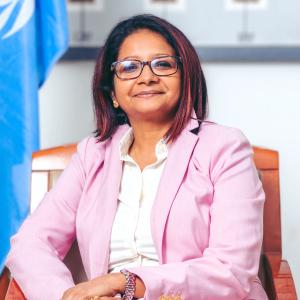Good Morning!
It is with immense gratitude that I address you today in Dodoma at this pivotal event— Integrated Planning and Reporting Tool (IPRT) training in Tanzania: Capacity Building for National Experts.
I would like to take this opportunity to acknowledge the President’s Office Planning Commission for its visionary leadership in driving forward integrated development planning in Tanzania. I wish to thank the Ministry of Finance for all their support and cooperation. I also extend our deep appreciation to the Economic Commission for Africa (ECA) for being a key technical partner in supporting the alignment of Tanzania’s NDP with the SDGs, Agenda 2063, and the Doha Programme of Action.
As we gather here today, it is worth reflecting on the transformative moment we are in, in the context of the recent UN Summit of the Future in New York, where global leaders renew their commitments to multilateralism and sustainable development. In this context, the Integrated Planning and Reporting Toolkit (IPRT) plays a crucial role in assisting African countries in digitally integrating the Sustainable Development Goals (SDGs) and Agenda 2063 into their National Development Plans (NDPs), ensuring the alignment of these plans with global and regional agendas.
The recent upgrades to the IPRT—including the Integrated National Financing Framework (INFF) module—have further enhanced its ability to align national financing strategies with NDPs. Moreover, the toolkit now features a new module that helps countries to integrate their National Development Plans with the Doha Programme of Action for the Decade 2022-2031. These enhancements come at a critical time as we work together toward the shared vision of a more sustainable and resilient future.
Today marks a pivotal moment for both the 2030 Agenda, which is passing its midpoint, and Agenda 2063, now entering its Second Ten-Year Implementation Plan. However, we must acknowledge that progress toward these agendas has been tested in recent years. The world has experienced deceleration and even reversals in some areas due to the cascading effects of the global ‘polycrisis.’ Yet, despite these challenges, we are here today as a testament to resilience and continued determination. Closer alignment between national development and international goals become obviously important in this context.
This training is a strong reflection of Tanzania’s commitment to development, sustainability, and resilience in the face of adversity. Tanzania has shown leadership in advancing integrated planning. Today marks the first IPRT training for Tanzania, aimed at digitalizing its latest National Development Plan (National Five-Year Development Plan 2021/22 – 2025/26, or FYDP III). This effort will ensure that Tanzania’s NDP is aligned with global and continental frameworks, including the 2030 Agenda, Agenda 2063, and the Doha Programme of Action.
The UN system and the Resident Coordinator’s Office in Tanzania remains deeply committed to supporting the United Republic of Tanzania. We continue to partner with key national stakeholders to support SDGs-related planning and reporting, alignment of development plans and streamlining the development architecture. This training will support the United Nations’ ongoing efforts in Tanzania to assist the government through the UN Sustainable Development Cooperation Framework 2022-27.
In closing, I want to reaffirm the commitment of the Resident Coordinator’s Office to work closely with the Government of Tanzania. We are dedicated to strengthening our partnership with the Govt. to ensure the successful implementation of the national development plans, Sustainable Development Goals, Agenda 2063, and the Doha Programme of Action in Tanzania. Together, we can pave the way for a more sustainable and prosperous future for all.
Thank you.



















